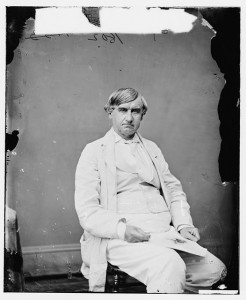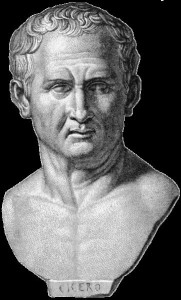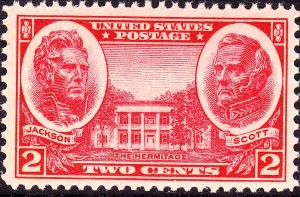No Neutrality for This Kentuckian
On June 13, 1861 The New-York Times published a very long letter from Joseph Holt, a Kentuckian who had most recently served as President Buchanan’s Secretary of War during the last couple months of that administration. Here’s a couple excerpts:
A LOYAL VOICE FROM KENTUCKY.; Noble Letter of Ex-Postmaster General Holt. NEUTRALITY SUICIDAL. THE POLICY OF PRESIDENT LINCOLN DEFENDED.
WASHINGTON, Friday, May 31, 1861.
J.F. SPEED, Esq. — My Dear Sir: The recent overwhelming vote in favor of the Union in Kentucky has afforded upspeakable gratification to all true men throughout the country. …
The Legislature, it seems, has determined by resolution that the State, pending the present unhappy war, shall occupy neutral ground. I must say, in all frankness, and without desiring to reflect upon the course or sentiments of any, that, in this struggle for the existence of our Government, I can neither practice nor profess nor feel neutrality. I would as soon think of being neutral in a contest between an officer of justice and an incendiary arrested in an attempt to fire the dwelling over my head; for the Government whose overthrow is sought is for me the shelter not only of home, kindred, and friends, but of every earthly blessing which I can hope to enjoy on this side of the grave. If, however, from a natural horror of fratricidal strife, or from her intimate social and business relations with the South, Kentucky shall determine to maintain the neutral attitude assumed for her by her Legislature, her position will still be an honorable one, though falling far short of that full measure of loyalty which her history has so constantly illustrated. Her Executive, ignoring, as I am happy to believe, alike the popular and legislative sentiment of the State, has, by proclamation, forbidden the Government of the United States from marching troops across her territory. This is in no sense a neutral step, but one of aggressive hostility. The troops of the Federal Government have as clear a constitutional right to pass over the soil of Kentucky as they have to march along the streets of Washington; and could this prohibition be effective, it would not only be a violation of the fundamental law, but would, in all its tendencies, be directly in advancement of the revolution, and might, in an emergency easily imagined, compromise the highest national interests. I was rejoiced that the Legislature so promptly refused to indorse this proclamation as expressive of the true policy of the State. But I turn away from even this to the ballot-box, and find an abounding consolation in the conviction it inspires, that the popular heart of Kentucky, in its devotion to the Union, is far in advance alike of legislative resolve and of Executive proclamation.
Equally vain is it for them to declare that they only wish “to be let alone,” and that, in establishing the independence of the seceded States, they do those which remain in the old Confederacy no harm. The Free States, if allowed the opportunity of doing so, will undoubtedly concede every guarantee needed to afford complete protection to the institutions of the South, and to furnish assurances of her perfect equality in the Union; but all such guarantees and assurances are now openly spurned, and the only Southern right now insisted on is that of dismembering the Republic. It is perfectly certain that in the attempted exercise of this right neither States nor statesmen will be “let alone.” Should a ruffian meet me in the streets, and seek with his ax to hew an arm and a leg from my body, I would not the less resist him because, as a dishonored and helpless trunk, I might perchance survive the mutilation. It is easy to perceive what fatal results to the old Confederacy would follow should the blow now struck at its integrity ultimately triumph. We can well understand what degradation it would bring to it abroad, and what weakness at home; what exhaustion from incessant war and standing armies, and from the erection of fortifications along the thousands of miles of new frontier; what embarrassments to commerce from having its natural channels encumbered or cut off; what elements of disintegration and revolution would be introduced from the pernicious example; and, above all, what humiliation would cover the whole American people for having failed in their great mission to demonstrate before the world the capacity of our race for self-government.
While a far more fearful responsibility has fallen upon President Lincoln than upon any of his predecessors, it must be admitted that he has met it with promptitude and fearlessness. CICERO, in one of his orations against CATALINE, speaking of the credit due himself for having suppressed the conspiracy of that archtraitor, said, “If the glory of him who founded Rome was great, how much greater should be that of him who had saved it from overthrow, after it had grown to be mistress of the world?” So may it be said of the glory of that statesman or chieftain who shall snatch this Republic from the vortex of revolution, now that it has expanded from ocean to ocean, has become the admiration of the world, and has rendered the fountains of the lives of thirty millions of people fountains of happiness. …
And Speaking of Strong Unionists
BUFFALO, Thursday, June 13.
A salute of seventy-five guns was fired by the citizens of Buffalo this noon in honor of the birthday of the veteran soldier, Gen. SCOTT.
_________________________________
According to Wikipedia Joseph Holt:
joined the Army as a colonel in 1862 and was appointed by President Abraham Lincoln to be the Judge Advocate General of the Union Army; two years later, he was promoted to brigadier general. He was the first Judge Advocate General to hold general’s rank.



